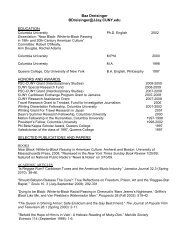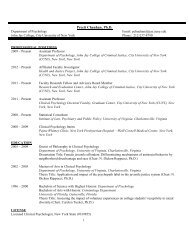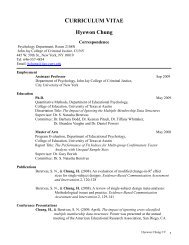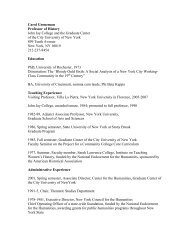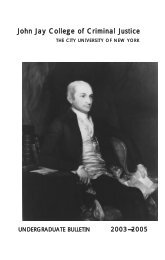Bulletin - John Jay College Of Criminal Justice - CUNY
Bulletin - John Jay College Of Criminal Justice - CUNY
Bulletin - John Jay College Of Criminal Justice - CUNY
Create successful ePaper yourself
Turn your PDF publications into a flip-book with our unique Google optimized e-Paper software.
Courses <strong>Of</strong>fered<br />
PSC 223 Personnel Administration and Supervision<br />
3 hours, 3 credits<br />
The essentials of personnel management and fundamentals of<br />
supervision and leadership as applied to administration.<br />
Consideration of supervisory problems with a police/security system.<br />
Application of labor relations to effective performance. Topics<br />
include discipline, motivation, training, job classification, salary<br />
standards and promotion.<br />
Prerequisites: ENG 101 and one of the following: PSC 101, CRJ 101<br />
or ICJ 101<br />
PSC 227 Police Training Programs: Goals, Content<br />
and Administration<br />
3 hours, 3 credits<br />
An examination and evaluation of various police training programs,<br />
both historical and current: goals, purposes, course content and<br />
teaching techniques of such programs. An examination of their<br />
organization, administration, financing, and relationship to police<br />
departments, universities, foundations, and city, state and federal<br />
agencies.<br />
Prerequisites: ENG 101 and one of the following: PSC 101, CRJ 101<br />
or ICJ 101<br />
PSC 230 Sex <strong>Of</strong>fenders in the <strong>Criminal</strong> <strong>Justice</strong><br />
System (Same course as COR 230)<br />
3 hours, 3 credits<br />
The aim of this course is to develop an understanding of the causes of<br />
sexual crimes and how sex offenders are dealt with throughout the<br />
criminal justice process. There is an analysis of the laws that relate to<br />
sex offenders and the cyclical nature of sex offender legislation. The<br />
course examines the difficulty of balancing rights of the offenders<br />
and rights of the community, and what forms of community<br />
protection are viable for these individuals. By the end of the course,<br />
students should have an understanding of sex offender typologies,<br />
types of treatment offered, laws and policies regarding sex crimes,<br />
and the likely future direction of legislation.<br />
Prerequisites: ENG 101 and one of the following: COR 101, PSC<br />
101, CRJ 101 or ICJ 101<br />
PSC 235 Women in Policing<br />
3 hours, 3 credits<br />
An analysis of the social and political forces that guided the evolution<br />
of women’s role in policing from ancillary specialist to integrated<br />
member of the police establishment. Role enhancement from “Police<br />
Matron” to “Policewoman” to “Police <strong>Of</strong>ficer” is studied against the<br />
backdrop of women’s reform movements. Title VII, Equal<br />
Opportunity Act of 1972 and Supreme Court rulings abolishing<br />
barriers to women in policing are examined. Study of women police<br />
in other countries, in state and federal agencies. Topics include<br />
female officers’ occupational role conflicts; performance on patrol;<br />
coping with physical and psychological stressors — male peer<br />
prejudice, jealous mates, favoritism, sexual harassment; women’s<br />
special attributes in policing; female detectives; the future, including<br />
the role of women in key policy-making decisions.<br />
Prerequisites: ENG 101 and one of the following: PSC 101, CRJ 101<br />
or ICJ 101<br />
PSC 245 Community Policing<br />
3 hours, 3 credits<br />
An overview of the major concepts and issues involved in what many<br />
consider to be a major fundamental shift in the approach and<br />
operations of modern policing. Topics include the origins, meaning,<br />
development, experiences and the record of community policing.<br />
Course also explores various assessments of the advantages and<br />
disadvantages of community policing.<br />
Prerequisites: ENG 101 and one of the following: PSC 101, CRJ 101 or ICJ 101<br />
PSC 250 <strong>Criminal</strong> <strong>Justice</strong> in Eastern Europe<br />
3 hours, 3 credits<br />
This course examines in detail the criminal justice systems in various<br />
Eastern European countries including the police, defense and<br />
135



